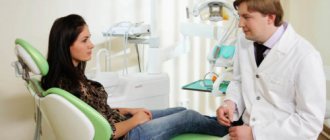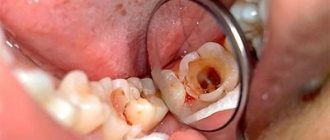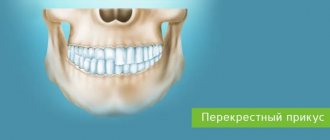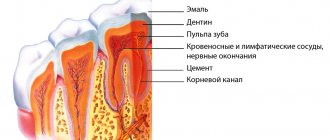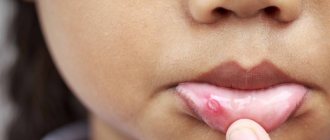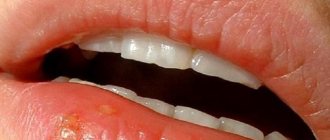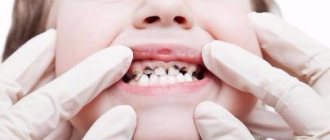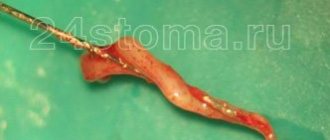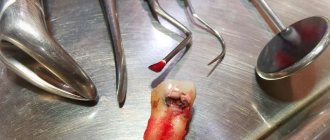Author of the article:
Soldatova Lyudmila Nikolaevna
Candidate of Medical Sciences, Professor of the Department of Clinical Dentistry of the St. Petersburg Medical and Social Institute, Chief Physician of the Alfa-Dent Dental Clinic, St. Petersburg
Pulpitis is an inflammatory disease that causes severe pain and can lead to many complications if not treated in a timely manner. In pregnant women, this disease is often particularly acute and poses a danger to the health of the mother and fetus. You will learn about the peculiarities of the course of pulpitis in pregnant women, as well as about the peculiarities of treatment of this disease during gestation from our material.
Pulpitis in pregnant women
A pregnant woman's teeth are especially susceptible to the negative effects of pathogenic bacteria. This contributes to the more frequent development of caries and pulpitis. There are several reasons why a pregnant woman's teeth are more susceptible to disease:
- The development of pulpitis is promoted by saliva, the composition of which is influenced by changes in hormonal levels.
- Contact with enamel of vomit during toxicosis. They have a low level of acidity, which leads to thinning of tooth enamel.
- Supplying gums with plenty of blood. The gums become loose and susceptible to the negative influence of bacteria. As a result of inflammation, caries appears, developing into pulpitis.
- A large amount of calcium is required for normal fetal development. The lack of this element in the body of the expectant mother leads to tooth decay.
If pain occurs, you should consult a specialist. The method of treating the disease is determined by the dentist. Delaying treatment can lead to complications and the development of other diseases.
What is pregnancy characterized by - a dentist's point of view
During pregnancy, the body undergoes a large-scale restructuring - hormones and glands begin to work differently. There may be a deficiency of key micro- and macroelements, and the calcium-magnesium balance, which is especially important during this period, is disrupted. During pregnancy, the composition of saliva changes - it is more viscous, its PH is shifted to acidic, and its mineralizing ability decreases. This increases the risk of bone damage, gum problems and tooth decay.
The need for treatment of pulpitis
Some women do not know whether they should have dental treatment during pregnancy, or whether the procedure should be postponed until postpartum. Pulpitis must be treated when it appears. Several reasons requiring immediate treatment of the disease:
- Pulpitis is inflammation of the neurovascular bundle of the tooth. Untimely treatment leads to the absorption of bacteria into the blood of the expectant mother. This can lead to fetal developmental disorders.
- Presence of acute throbbing pain. Promotes the production of large amounts of hormones. This negatively affects the development of the child. Severe toothache can lead to uterine contractions and premature birth.
- Infection in the gastrointestinal tract. Infections that enter the gastrointestinal tract from the tooth can lead to late toxicosis.
Taking into account the above factors, a pregnant woman should immediately consult a dentist if symptoms of pulpitis appear.
Tooth decay and gum problems
Carious lesions are a significant risk for pregnant women. It increases with calcium-magnesium deficiency (which is why it is so important to take vitamin-mineral complexes). Saliva, which has a reduced quantity and mineralizing ability, cannot fully wash the teeth, enrich the enamel with minerals and remove food debris (this is why professional cleaning is required). This provokes caries, so at the slightest symptoms you need to consult a doctor. The appearance of dark spots on the enamel and an exacerbation of the reaction to cold, hot, and sour should alert you.
How long does it take to treat pulpitis?
Treatment of pulp inflammation has features depending on the stage of pregnancy. The expectant mother needs to inform the dentist about her situation and the stage of pregnancy. The specialist will select medications that will not harm the baby’s health for a certain period of time.
First trimester (from the moment of conception to the 12th week inclusive)
Treatment of pulpitis in pregnant women in the first trimester is not recommended. During this period, the fetus experiences increased sensitivity to toxins. The use of even the safest anesthesia can provoke developmental disorders.
The need for treatment is determined by the dentist. Treatment of chronic pulpitis is postponed to a later date. In the first trimester, the disease is treated during exacerbation.
Second trimester (from week 13 to week 28 inclusive)
At this time, the likelihood of harm to the fetus during dental treatment is reduced. The second trimester is the most favorable period for the treatment of pulpitis during pregnancy. The doctor performs the treatment under local anesthesia. Drugs are used that have a minimal amount of vasoconstrictor substances and do not penetrate the placenta. Such medications do not harm the baby.
Third trimester (from 29 weeks until birth)
The presence of acute toothache in a pregnant woman in the later stages can lead to premature birth. In the third trimester, treatment of pulpitis is necessary. Before visiting the dentist, you should consult with a gynecologist accompanying your pregnancy.
First aid for acute toothache. How to relieve pain at home?
- For completely unbearable toothache, you can take painkillers. The safest medications during pregnancy are those containing paracetamol.
- Clean the carious cavity, rinse your mouth with a warm solution, which contains: 1/2 teaspoon of baking soda, 1/2 teaspoon of salt and a few drops of iodine.
- You can use dental drops (Denta or others) by applying a swab soaked in them to the gum.
- Attacks of pain are reduced by rinsing the mouth with herbs: a decoction of calendula, chamomile, valerian, St. John's wort, plantain.
- A very ancient and effective remedy is applying garlic to a sore tooth. You can also apply crushed garlic to the pulsating vein on the wrist (to the left hand for tooth pain on the right side and to the right hand if the tooth hurts on the left side).
- Never apply warm compresses to a sore spot.
Important! The listed methods are temporary - they will only slightly reduce toothache, but will not cure pulpitis! So don't put off visiting the dentist!
Stages of treatment
Treatment of pulpitis is carried out in one or several visits to the doctor. Treatment is carried out in several stages:
- Diagnostics. The doctor conducts a survey and examination of the pregnant woman’s oral cavity.
- Introduction of anesthesia. The drugs used are safe for the fetus.
- Removal of the part of the tooth affected by caries.
- Pulp removal. A pulp extractor is used - a rod with spikes that engage the tissue.
- Cleaning of channels and their mechanical treatment.
- Installation of a seal. The root canals and crown part of the tooth are filled.
- Checking the filling of the canals using radiography.
In some cases, treatment is carried out in 2–3 visits to the doctor. For the period between appointments, the doctor installs a temporary filling. It protects the tooth cavity from food and pathogenic bacteria.
Anesthesia: endure or treat teeth with painkillers
For many years, pregnancy and anesthetics were considered incompatible. Expectant mothers preferred to stoically endure pain and discomfort during treatment, causing harm to themselves and the baby through stress. Today, thanks to modern drugs, teeth are successfully sanitized under anesthesia, which is not harmful during pregnancy. Their impact is not comparable to the harm caused by severe pain. It disrupts a woman’s emotional state, provokes disruptions in metabolism and the functioning of internal organs, and takes the central nervous system out of control.
At the border of dentin and enamel, the density of nerve endings is greatest, so unpleasant sensations in the tooth appear even with minor damage. During pregnancy, help is needed at the slightest discomfort and should never be tolerated. The doctor needs to inform the deadline, take an exchange card to the appointment, he will select a drug that eliminates the pain and carry out treatment without discomfort. During pregnancy, local anesthetics with a small proportion of adrenaline are allowed - they do not penetrate the hemoplacental protection. The well-known lidocaine is not recommended: it weakens the expectant mother, provokes muscle spasms and lowers blood pressure. Modern products are hypoallergenic, non-toxic, and well tolerated. Doctors consider the following to be the optimal drugs:
- ultracaine - it is allowed both during pregnancy and at the lactation stage, since it does not accumulate in milk;
- Primacaine with a minimal percentage of penetration through the placental protection - it has a short half-life, it is allowed even for small children;
- ubistezin, alfacaine, artifrin and other drugs based on anticaine.
In any case, the doctor will clarify how the pregnancy is progressing, select the minimum, necessary and sufficient dose, and recommend approved medications to take after treatment in the office.
Use of radiography
Treatment of pulpitis involves the use of x-rays. They are necessary for the dentist for diagnostics, high-quality cleaning of root canals from inflamed pulp and control over the quality of the work performed.
The dentist must take into account the individual characteristics of each patient’s teeth. To determine the depth, location and curvature of the root canals, the specialist needs to send the expectant mother for an x-ray. This will allow him to get a more detailed picture and correctly treat pulpitis.
Radiography during dental treatment does not harm the health of the fetus. The rays pass through the tissue in the tooth area. A specialized apron that does not transmit x-ray radiation is put on a pregnant woman's stomach. This makes the procedure safe for the baby.
Treatment of pulpitis during pregnancy is necessary. The presence of the disease can negatively affect the fetus. A timely visit to the dentist will help avoid complications and the development of other diseases.
Clinical researches
Clinical studies have proven that regular use of professional toothpaste ASEPTA REMINERALIZATION improved the condition of the enamel by 64% and reduced tooth sensitivity by 66% after just 4 weeks.
Sources:
- Report on the determination/confirmation of the preventive properties of personal oral hygiene products “ASEPTA PLUS” Remineralization doctor-researcher A.A. Leontyev, head Department of Preventive Dentistry, Doctor of Medical Sciences, Professor S.B. Ulitovsky First St. Petersburg State Medical University named after. acad. I.P. Pavlova, Department of Preventive Dentistry
- The role of hygiene products in the treatment of periodontal diseases (S.B. Ulitovsky Honored Doctor of the Russian Federation, Honored Dentist StAR Prof., Doctor of Medical Sciences, Department of Preventive Dentistry of Pavlov Pavlov State Medical University, St. Petersburg) S.B. Ulitovsky - Honored Doctor of the Russian Federation, Honored Dentist of StAR, Prof., Doctor of Medical Sciences; E.S. Alekseeva - associate professor, candidate of medical sciences; A.A. Vasyanina - associate professor, candidate of medical sciences; V.A. Grigoriev - Associate Professor, Ph.D.
- The role of anti-inflammatory rinse in the treatment of periodontal diseases (L.Yu. Orekhova, A.A. Leontyev, S.B. Ulitovsky) L.Yu. OREKHOVA, Doctor of Medical Sciences, Prof., Head of Department; A.A. LEONTIEV, dentist; S.B. ULITOVSKY, Doctor of Medical Sciences, Prof. Department of Therapeutic Dentistry of St. Petersburg State Medical University named after. acad. I. P. Pavlova
Diagnostics: do's and don'ts
When treating the canal system, the bone surrounding the teeth and in other cases, it is necessary to carry out x-ray diagnostics. Pregnancy and classical “targeted” studies are incompatible. The growing fetus and its cells are susceptible to radiation exposure. However, even strict SanPin standards do not prohibit dental examinations according to indications, although they recommend postponing them to 16-25 weeks of pregnancy.
Today, advanced devices generate minimal doses of rays comparable in impact to watching TV or working at a computer for two hours. For greater safety during pregnancy, the abdomen and pelvic area are covered with a lead “apron” that blocks radiation, but even this is not necessary if the doctor uses a progressive technique.
Doctors consider digital radiovisiographs to be safe devices, whose radiation “load” is 90% less than in film devices. To carry out diagnostics using a compact device, you do not even need to leave the dental chair. There is an alternative - for example, DIAGNOcam devices, designed to analyze the coronal area of teeth. It is carried out without x-ray radiation, makes it possible to determine the degree of carious damage and carry out minimally invasive treatment.
Extraction, dental prosthetics and surgery during pregnancy
Pregnancy is accompanied by increased emotional and psychological stress, and even the thought of dental surgery provokes serious stress. Therefore, doctors try to replace it with treatment as much as possible, but in some situations this is impossible. These include:
- fractures of the roots and crowns of teeth;
- deep caries with purulent foci;
- cysts larger than 1 cm and other dental problems that cannot be solved with conservative methods.
Wisdom teeth are not removed without special indications to avoid alveolitis and other complications. To eliminate them, antibiotics are needed that are not compatible with pregnancy. If the case is obvious, and saving the tooth is dangerous due to focal infection or inflammation, surgery must be performed. It is performed under local anesthesia, but after its effect you need to be prepared for unpleasant sensations. Drugs approved during pregnancy, such as paracetmol, will help reduce them. In some cases, antibiotic therapy is also needed - the dentist will select safe medications.
Prosthetics, unlike implantation, is allowed during pregnancy, although the format of interventions is “cut down”. Teeth can be fitted with crowns and bridges, ground down, sanitized and prepared for procedures. However, if the case is not urgent, it is better to postpone prosthetics until after pregnancy.
The importance of dental hygiene - preventive measures during pregnancy
Pregnancy worsens the condition of teeth; large-scale interventions during pregnancy are often dangerous. At this time, preventive and hygiene measures are more important than ever. Preventing disease during pregnancy is much easier than sanitizing affected teeth. It is required to include in your child planning activities a dental examination and all necessary sanitation and preventive cleaning. It is also carried out during pregnancy - the schedule is drawn up by the dentist. To preserve your teeth and prevent them from deteriorating, you need to:
- thoroughly brush your teeth with a paste without lauryl sulfates (or with its minimum concentration);
- use remineralizing compounds that reduce the sensitivity of enamel and stabilize caries in the form of spots;
- eat right and take vitamins, paying attention to the sufficiency of calcium and magnesium in the diet.
All dental care necessary during pregnancy can be obtained at the Moscow clinic "Mazot".
Experienced doctors will select safe medications and methods of dental sanitation; the atmosphere will help you relax and avoid stress. The clinic performs all types of preventive, therapeutic and surgical interventions. After the procedures, the expectant mother will leave the office in a good mood, having solved the problem and maintained her health without harm to herself and the fetus. Make an appointment
